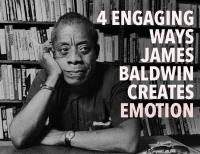In my last post, I published the first of a three part series on points of view (POV) and narrative voices. It’s been hard for me personally to figure out which POV is best to tell my story, stay true to my character’s voice and cater to my strengths as a writer.

So I turned to Walter Mosley’s This Year You Write Your Novel for some advice on the issue. Last time I shared his tips on the first person narrative. Next time I will discuss the omniscient voice. Today is all about writing in the third person limited and third person omniscient.
Third-Person Limited Narrative
Mosley describes the third-person narrative as “a small, emotionless, but intelligent creature sitting on the shoulder of the character who is experiencing the story.” For example:
“Brent Farley entered the room looking around for his mother. Instead he saw Alice Norman standing near the buffet…Her fingers were cold, and so, Brent noticed, were her eyes.”
The Third-Person Limited Narrative Creates Distance
Much like the first-person POV, the third-person perspective provides the reader and the writer with a natural way of reading/telling a story. However, it’s far less intimate. This POV is an intellectual, impartial observer who is quite knowledgeable about the character’s life yet removed from her passions.
This approach puts less pressure on the character’s voice because it’s even tempered, steady. That said, it may also make it more challenging for you to convey emotional depth as Mosley writes, “ you can give momentary glimpses into [the character’s mind], but you cannot, as a rule, get deeply into her heart.”
The Third-Person Narrator Can Be Knowledgeable About Multiple Characters
One benefit of using this POV is that it’s relatively easy to jump from one character’s perspective to the next. For example, if two characters have a confrontation and then separate, you can describe each character’s reactions and next steps in consecutive scenes.
In other words, the third-person narrator can have more knowledge that either character individually.
While the narrator can “sit on the shoulder” of several characters, it should do so for a reason. For example, if the story is centered on a conflict between two people, it makes sense to only use their experiences to tell it. There is also nothing stopping you from telling the story from a single character’s POV using the third-person. But the decision should be a thoughtful one.
First-Time Novelists Should Consider Using Third-Person Limited Narrative
Mosley suggests using this approach for your first novel. He says it’s the most flexible and durable.
I think I get it. Creating a catchy enough voice/character to sustain a first-person POV is tough. That said, I believe that comes naturally for a lot of people, who are otherwise capable of writing a really amazing, intimate, or captivating story in the first-person. It’s a tough call.
What other narrative voices would you like to learn more about? Share in the comments section below.
PRACTICE
Take fifteen minutes to write a scene using the third-person narrative. Share with us in the comments below!







I think that this is my favorite type of narrative. I always feel like I understand the characters better if I can take a step back and see them as the world sees them. First person is so limiting and can make understanding a character difficult.
Rachel glances at the window expecting to see the snow that the weatherman is constantly droning on about. Supposedly there will be a foot of new snow by the end of today. Why did her mother transplant them from sunny and warm Texas to northern Maine? Rachel had learned precisely one thing since moving a week ago: the cold was brutal. It made breathing hurt and it slowed everything down. Traffic moved at a crawl,
and the people could only move so fast against the chilly “nor’easter” that
heaped more and more snow against the ground. Rachel grimaced when the first
few flakes fell against the top of the last bits of unmelted snow. Great,
though Rachel, simply great. We already have three inches down, do we really
need more?
Just as Rachel finished griping about the snow to herself, her mother ran into the room, gushing about the so-called beautiful flakes. “Hey, Rachel! Aren’t they beautiful? This time we may actually get snowed in! Won’t that be great? I got extra hot chocolate from the store and some more nonperishable. We are going to have tons of fun this weekend –”
Mentally Rachel cuts off her mother’s excited chatter. She doesn’t want hot chocolate,
she doesn’t want a nice hot bowl of soup, and she certainly doesn’t want to go
outside in the freezing cold weather. There was only one thought on Rachel’s
mind: how to get back to where she belonged, in the piping hot days of Texas.
She missed her friends, especially Jamie, how had been much closer than “just a
friend” as she had said to her mother. He wasn’t just a friend anymore, he was
gone. Just like all of the others that she knew from her home.
Interesting that you use the term “piping hot days of Texas.” I’ve never heard that term used except when referring to food. I think it means boiling hot!
If you’ve ever been to Texas in the middle of summer you would probably agree with me. It is ridiculously hot there.
Yes, I grew up in western Texas. I would certainly agree with you there 🙂 . But at least it’s a DRY heat 😉 . Here in Kansas, the humidity is a killer!
That’s funny. I lived quite a few years in Kansas after living in Florida, and dried out like a fish out of water. Now I live in Louisiana where the humidity is ridiculous. Step outside and you can almost swipe your hand through a cloud of moisture!
I guess it’s all in what you are used to! Probably even the dry heat of west Texas would feel humid to someone from the desert Southwest. I personally would rather deal with cold than humid heat. You can always put on another layer – but there’s a limit to what you can take off 🙂
.
There’s more than one type of third-person narration. “Omniscient voice” is a third-person narrative. Stop trying to rewrite the basics.
See above about third person v. omniscient. Also, these posts (based on the teachings of the extremely prolific and accomplished author Walter Mosley) is more about explaining the different techniques authors can use and the pros and cons. So, sure, omniscient is a type of third-person narrative, but it’s also sufficiently different and complicated to earn its own post and be helpful to others.
I found the post very helpful and look forward to the next one.
Thank you
I thought there was omniscient POV, which is a distant “wanderer” who observes and can understand all perspectives at the same time, and a different “character based” POV (that is used in many thriller/suspense novels with multiple character perspectives that change in each chapter. I am currently writing a novel with two main characters, written in third person. It allows me to actually dive into their thoughts and perspectives, much in the same way you do in first person. I think the trick is that I am limiting myself to one characters perspective in each chapter or major scene, so it feels like first person.
Hey Etienne! Haha. Yeah, I think that’s right. It’s more the third-person narrative voice used for different characters’ points of view. But the narrator’s knowledge is limited to a couple characters. From what I understand about the omniscient voice (which I haven’t re-reviewed in depth yet) is that it’s “all knowing,” meaning the narrator knows (and can comment) about all the characters (including their deepest feelings), about the history of the world, the way the universe works, what will happen in the future, etc.
Also, I think there is a lot of range w/in each of these. Some people will go more into people’s thoughts than others.
From my WIP, a children’s novel set in the Midwest on the brink of the Great Depression. Mama and Papa are moving with their five children to northern Minnesota, where they hope to be able to survive hard times by living off the land. In this scene, Dorsey, a 12-year-old girl, is saying goodbye to her grandmother as they prepare to drive away.
————-
Dorsey’s chin quivered as she threw herself into Gram’s warm embrace. She tucked away the memory that she came up to Gram’s shoulder on the day they moved away. “Be sure to help your Mama and Papa with the young’uns and write me a letter every week so I’ll know what you are up to,” Gram whispered in Dorsey’s ear, as she tucked a small roll of two-cent postage stamps into her pants pocket. “I’m gonna miss you something awful, young lady. You know that, don’t you?”
Dorsey nodded. She struggled to say something, but the words caught in her throat. She gave Gram another silent squeeze. She climbed into the truck, swiped the tears from her cheeks with the back of her hand and called to Lola and Henry. Mama would sit up front with Papa. Fred planned to stand on the running board and hold onto the door for most of the trip.
This is a very sweet scene. You really capture the relationship of Dorsey and her grandmother.
What’s the difference between this and omniscient? I’ve been told that 3rd person just tells the story and is neutral(doesn’t have commentary. While omniscient can poke fun at the narrative and tell it in a quirky and sassy manner. Terry Pratchett and C.S. Lewis come to mind. This, to me, feels as intimate as 1st person as it feels like the author is just next to me, telling their story. P.S. It’s night here so I’m going to post what I’m going to write tomorrow.
When Jazmine awoke, she was very confused. She was pretty sure she was dead. How likely was it that somebody could survive a jump off a four storey building? She hadn’t thought it was very likely, which was why she had done it. She sat up and found herself in an all white room-one of those ones that you see on TV. This was definitely not Heaven. Jazmine had never really believed in an afterlife. She almost regretted it now. Could this be Hell?
She searched for anything that would give her a clue as to where she was but the only thing in the room was a screen on the wall. She stood up, shaking her stiff legs and examining the bruises on her arms. Her legs felt weak but she managed to stumble to the screen It simply said:
Touch to Begin
With nothing else to do, Jazmine touched the screen. A scene began to play out. She recognised it immediately. There she was with her toes over the edge of the building. A moment later her friend Kayli had burst on to the rooftop.
“Jaz! NO, DON’T!” she had screamed. Jazmine studied the blank look on her own face. She didn’t remember that part. Kayli came up behind her and tried to pull her away from the edge.
“Leave me,” Jazmine had said, no emotion in her voice.
Kayli had wrapped her arms around her then.
“If you’re going to jump then you’re taking me with you,” Kayli said.
There was no expression on her face as Jazmine jumped, taking her best friend with her. In the white room, Jazmine closed her eyes. She didn’t want to see their two bodies broken on the ground. Why had she jumped?
Her tears fell unchecked as she trembled. What had she done?
A quiet beeping came from the screen. Jazmine opened her eyes and saw a question flashing across a red background.
So you think you can play God?
My very second story. It is, actually, reflects me writing this one, the very first one https://thewritepractice.com/point-of-view/#comment-1741604319
“On writing At the Platform Edge”
He definitely knew what to write about. The idea had
been in his mind for quite a while. One of the most significant events in his
life.
His mind was burning. Once again he lived this moment.
One of the most painful moments in his life.
Yet he wasn’t sure if he’s going to share this story.
Memories was flowing from his head. Through his
fingers. Into the screen of his laptop.
While typing he was swallowing tears. The break-up, he
was writing about, happened a year ago. But he still felt it with all his
heart.
What a challenge is to flesh out this pain in just
fifteen minutes. All the pain he had been bearing the entire year.
All he could think of was the time preceding the
break-up. He was still in love.
And a miracle happened to him. No, he didn’t free from
his hopeless love. He even experienced it once more. And enjoyed it. The miracles
was… happiness.
P.S. I don’t ask to appreciate it. I ask right the opposite. Please, critisise it.
Thank you for your attention.
Yours,
Jean Fleury.
Isn’t the close third person more intimate than a general third person?
Sitting in the room, Bill sat quietly, demurely sipping on a cup of tea. The social security office was vastly boring; the wallpapers were bland, the equipment looked used and the faces signalled and spoke and gestured without expression. Bill sat under the effects of LSD, however, and the ‘trip’ had started as he sat down and waited for his number.
this was not really what Bill expected the day held for him. But hed made a choice to take the LSD firstly, like one of many. one of many bad choices that connected and formed his recent life, or most of what he could remember at least. the last consultant hed had to speak to had scared him. he remembered, he was under the influence of some drug; he couldnt remember the name of it, and he remembered hearing loud thumping noises from under the desk every time he spoke.
i hope they dont figure me out, he thought to himself, and the look of some of the cold consultants somehow made him feel less than the tiniest blob of shit on the bottom of a boot.
he wondered if he could meet someone, a friend, maybe someone who would make the place seem a little better. he looked for a suitable candidate. there was noone, so he then chose a person that looked the most normal. he picked an old lady sitting next to him.
“hello.” he smiled at her.
there was no reply. could she hear him?
he looked down, then he remembered his dignity, this was not a place you ‘met someone’.